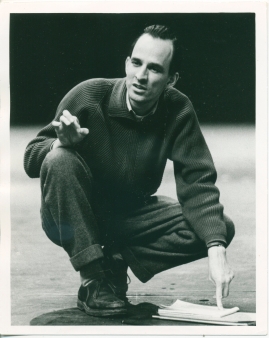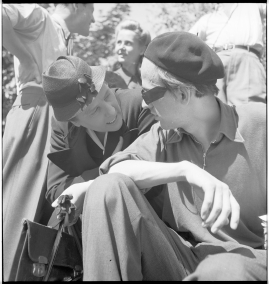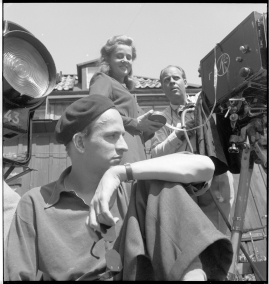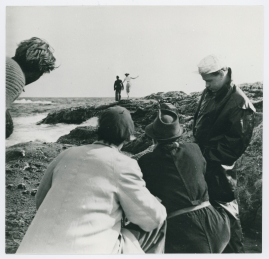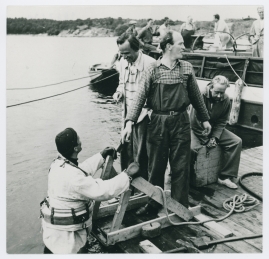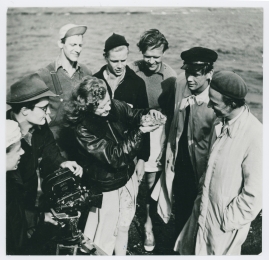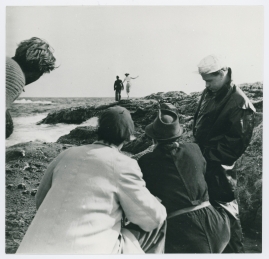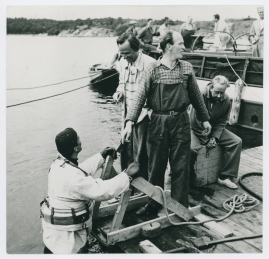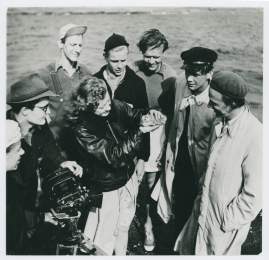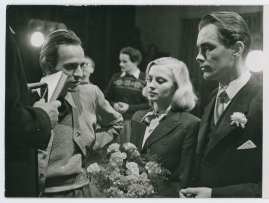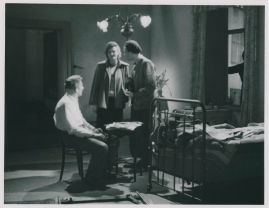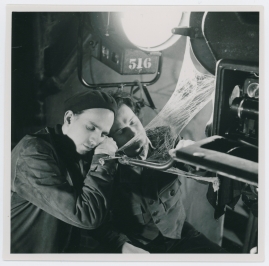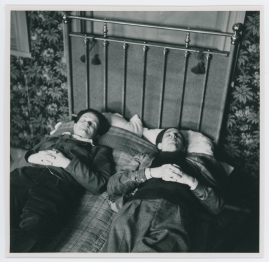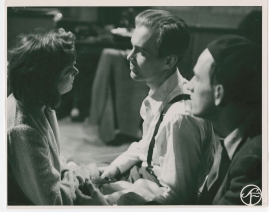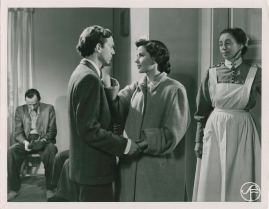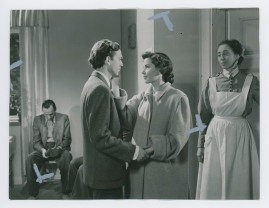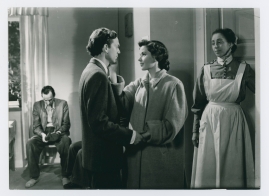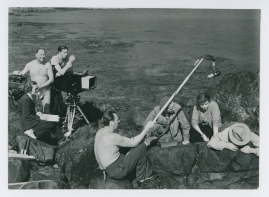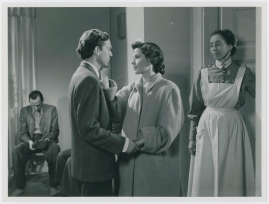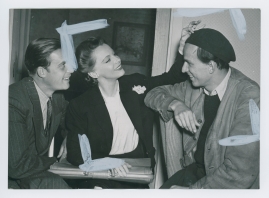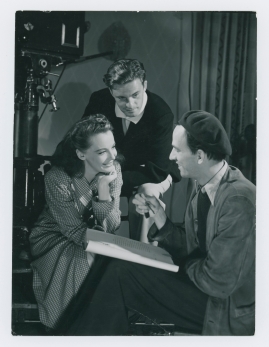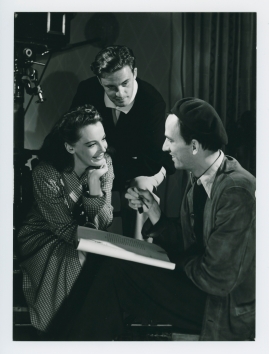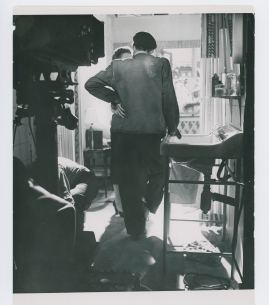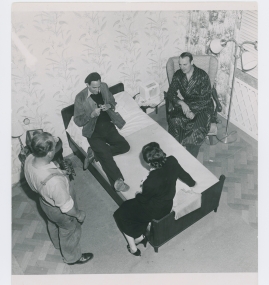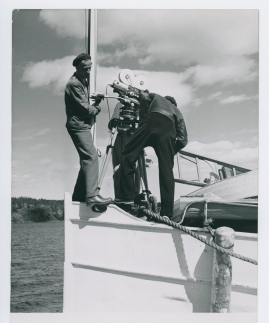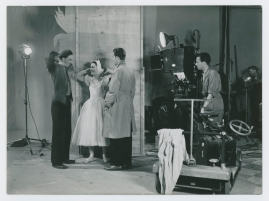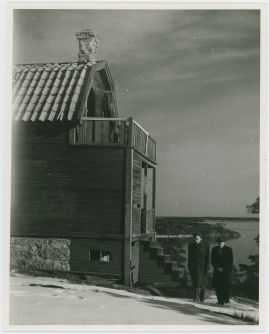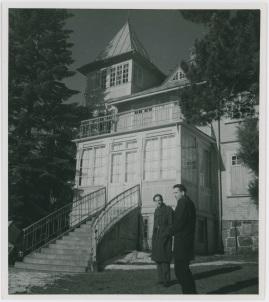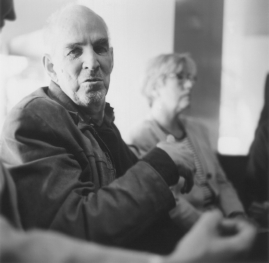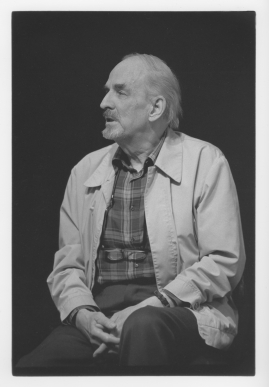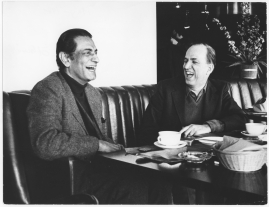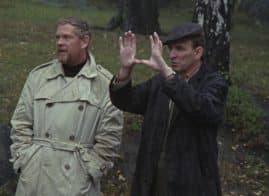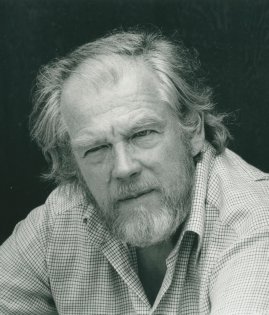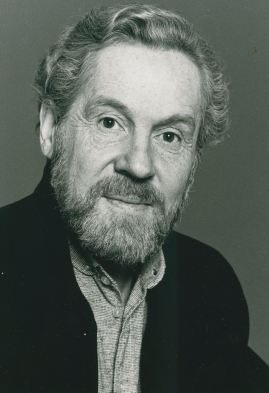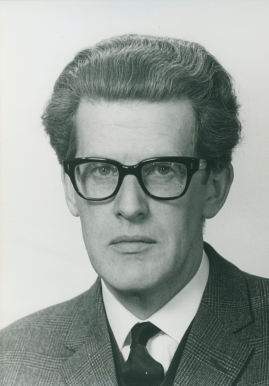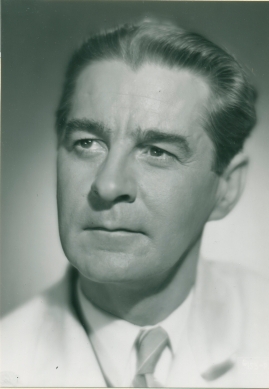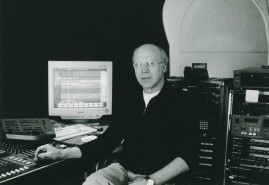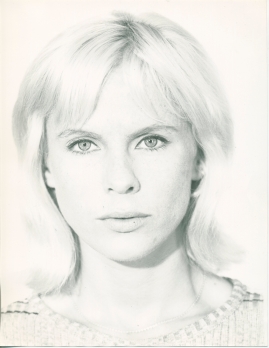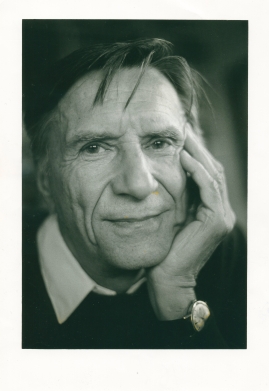Ingmar Bergman
Basic facts
Media (34)
| Director |
|
|---|---|
| Screenplay |
|
| Show all films | |
| Awards |
|
Biography
Swedish film and theatrical director, scriptwriter, playwright, author. Born in Uppsala. Died at Fårö. Married to choreographer and dancer Else Fisher 1943-1945, to choreographer and director Ellen Lundström 1945-1950, to journalist Gun Grut 1951-1959, to concert pianist Käbi Laretei and to Ingrid von Rosen from 1971 until her death in 1995. Father of actress Lena Bergman, director Eva Bergman, film director Jan Bergman, actress and director Anna Bergman, actor and director Mats Bergman, director Daniel Bergman and author Maria von Rosen.-Not only is...
Links and resources
Biography
Swedish film and theatrical director, scriptwriter, playwright, author. Born in Uppsala. Died at Fårö. Married to choreographer and dancer Else Fisher 1943-1945, to choreographer and director Ellen Lundström 1945-1950, to journalist Gun Grut 1951-1959, to concert pianist Käbi Laretei and to Ingrid von Rosen from 1971 until her death in 1995. Father of actress Lena Bergman, director Eva Bergman, film director Jan Bergman, actress and director Anna Bergman, actor and director Mats Bergman, director Daniel Bergman and author Maria von Rosen.
-
Not only is Ingmar Bergman by far the best-known film director from Sweden; he also remains one of the most influential cinematographic artists in the world. He was born in 1918 to the nurse Karin Bergman, née Åkerblom, and the clergyman Erik Bergman in Uppsala. The family soon moved to Stockholm where Erik Bergman later became vicar in the parish of Hedvig Eleonora. After graduating from gymnasium and enrolling in the University of Stockholm, he spent a few years directing in small Stockholm theatres. In 1944 he was invited to the Helsingborg Stadsteater as its artistic director. 1944 was also the year of his film debut as writer of Torment (Hets, entitled Frenzy in the US), directed by Alf Sjöberg. Throughout his sixty-year career, Bergman combined directing for stage with film direction, interspersed with the occasional literary production.
In 1946 Bergman made his debut as director for the cinema with Crisis (Kris), a film version of the stage play "Moderhjertet" ('A Mother's Heart' by Leck Fischer). Like most of his subsequent works, he both wrote and directed the 1949 film The Devil's Wanton (Fängelse). Some years later he achieved international acclaim when his 1955 film Smiles of a Summer Night (Sommarnattens leende) won an award in Cannes. It is probably not just a coincidence that his work first came to the attention of international audiences in France. The influential film journal Cahiers du Cinéma was started in 1951 with the express ambition to feature directors with what the editors regarded as a unique and characteristic style. Jean-Luc Godard and Eric Rohmer, critics at Cahiers du Cinéma later to become famous film directors themselves, considered Bergman the ideal representative of the new values they strove to proliferate, i.e. the writer-director who uses the camera just as an author uses his pen. Godard, for one, called Bergman's Summer Interlude (1951, US title: Illicit Interlude) "the world's most beautiful film".
Two of Ingmar Bergman's most famous films, The Seventh Seal (Det sjunde inseglet) and Wild Strawberries (Smultronstället), both premiered in 1957. His tremendous capacity for hard work is evidenced by the fact that, all in that same year, Bergman staged "Peer Gynt" and "The Misanthropist" at the Malmö Stadsteater, was in the process of shooting So Close to Life (Nära livet, 1958, US title: Brink of Life) and directed his first television production, Herr Sleeman kommer ('Mr. Sleeman Arrives'), also that two films anonymously scripted by Bergman premiered - Lars-Eric Kjellgren's Nattens ljus ('Lights of the Night') and Kenne Fant's Prästen i Uddarbo ('The Pastor of Uddarbo'). Depending a little on which films are counted as his; Bergman made some sixty films, more than one hundred seventy stage productions and wrote approximately one hundred books and articles.
In the 1960s came the three films that comprise "The Trilogy on the Silence of God": Through a Glass Darkly (Såsom i en spegel, 1961), Winter Light (Nattvardsgästerna, 1963) and The Silence (Tystnaden), 1963. In 1964 came a film regarded as a total flop by audiences and critics alike, All these Women (För att inte tala om alla dessa kvinnor). Yet, two years later followed Persona, the film Bergman himself as well as many others saw as his greatest.
In the 1970s and 1980s Bergman emancipated himself by starting his own production company, Cinematograph AB. This meant he could be his own producer for Cries and Whispers (Viskningar och rop, 1973) and Scenes from a Marriage (Scener ur ett äktenskap), a 1973 television series of unprecedented popularity in Sweden. When arraigned on charges of tax evasion (later to prove unfounded), Bergman went into voluntary exile in Munich, West Germany, where, among other things, he worked as a director at the Residenztheater, as well as shooting films, such as From the Life of the Marionettes (Aus dem Leben der Marionetten,1980).
The premiere in 1982 of Fanny and Alexander (Fanny och Alexander) perhaps the only one of his films truly loved by his compatriots, marked Bergman's glorious return to Sweden. Although he declared it "my last movie", Fanny and Alexander was followed by several works for television, for instance After the Rehearsal (Efter repetitionen, 1984) and In the Presence of a Clown (Larmar och gör sig till, 1997). In his later years, Bergman mainly established his reputation as a respected author. Film versions of several of his books were directed by other people, for example The Best Intentions (Den goda viljan, Bille August, 1991), Sunday's Children (Söndagsbarn, Daniel Bergman, 1992) and Faithless (Trolösa, Liv Ullmann, 2000). Bergman's real last film was to be the television production, Saraband ('Sarabande'), written and directed by him at the age of 85 in the year 2003.
Basically the same theme with variations permeates all of Bergman's works: a universe peopled by dysfunctional families, humiliated but vampiric artists and an absent God symbolized by the characters' overall inability to communicate. His style is austere and unobtrusive, except for his uncompromising close-ups, denuding the human face as at once enticing and mysterious.
Bergman's importance to the art of film cannot be overestimated. His insistence on doing most of his works in his native Swedish, so minor a language, and their nonetheless resounding around the world is unprecedented. He is without a doubt Sweden's foremost twentieth century artist; perhaps the foremost ever.
Jan Holmberg (2011)
(translated by James Schmale)
Awards
| Festival Award | Toruń | 1998 | (Specjalna Zaba/särskild groda till alla tiders skaparduon Nykvist-Bergman; Camerimage) | ||
|---|---|---|---|---|---|
| The Guldbagge Award | Stockholm | 1993 | Best Screenplay | ||
| Prize | Tokyo | 1991 | (Praemium Imperiale) | ||
| Copenhagen | 1989 | (Sonningpriset; 500.000 dkr) | |||
| New York | 1989 | (OBIE-off Broadway Award för Hamlet) | |||
| Rome | 1988 | (hedersdoktor av universitet i Rom) | |||
| European Film Award | Berlin | 1988 | (specialpris) | ||
| Prize | Paris | 1985 | (Hederslegionen) | ||
| New York | 1985 | (American-Scandinavian Foundations kulturpris; 10.000 dol.) | |||
| David di Donatello Award | 1984 | (bästa manus) | |||
| 1984 | (bästa regi) | ||||
| Academy Award Nomination | Los Angeles | 1984 | (bästa manus 1983/Best Writing, Screenplay Written Directly for the Screen 1983) | ||
| Los Angeles | 1984 | (bästa regi 1983/Best Direction 1983) | |||
| Circle Prize | New York | 1983 | (bästa regi) | ||
| Award of the Swedish Association of Film Critics | 1983 | (årets film, långa versionen) | |||
| The Guldbagge Award | Stockholm | 1983 | Best Director | ||
| National Board of Review | 1978 | (bästa regi) | |||
| Academy Award Nomination | Los Angeles | 1978 | (Best Writing, Screenplay Written Directly for the Screen) | ||
| Los Angeles | 1976 | (Best Directing) | |||
| Circle Prize | New York | 1974 | (bästa manus) | ||
| Academy Award Nomination | Los Angeles | 1974 | (bästa regi / Best Director) | ||
| National Society of Film Critics | 1974 | (bästa manus) | |||
| Academy Award Nomination | Los Angeles | 1974 | (bästa originalmanus / Best Writing, Story and Screenplay Based on Factual Material or Material Not Previously Published or Produced) | ||
| National Board of Review | 1973 | (bästa regi) | |||
| National Society of Film Critics | 1972 | (bästa manus) | |||
| Circle Prize | New York | 1972 | (bästa manus) | ||
| New York | 1972 | (bästa regi) | |||
| The Irving Thalberg Award | Hollywood | 1971 | |||
| Festival Award | Venice | 1971 | (inofficiellt hederspris för hela Ingmar Bergmans verksamhet i samband med Beröringen) | ||
| National Society of Film Critics | 1970 | (bästa regi) | |||
| 1968 | (bästa regi) | ||||
| 1967 | (bästa regi) | ||||
| Chaplin Magazine Award | Stockholm | 1966 | |||
| The Guldbagge Award | Stockholm | 1964 | Best Director | ||
| Academy Award Nomination | Los Angeles | 1963 | (bästa manus 1962/Best Writing, Story and Screenplay - Written Directly for the Screen 1962) | ||
| Chaplin Magazine Award | Stockholm | 1963 | (även för Nattvardsgästerna) | ||
| Stockholm | 1963 | (även för Tystnaden) | |||
| Academy Award Nomination | Los Angeles | 1959 | (Best Writing, Story and Screenplay Written Directly for the Screen) | ||
| Festival Award | Cannes | 1958 | (bästa regi) | ||
| Prize | 1958 | (tyska filmkritikernas stora pris för regi) | |||
| Folket i Bild Magazine Award | Stockholm | 1955 | (bästa regi) | ||
| Stockholm | 1955 | (bästa manus) |
Films
Original work
| Author |
|
|---|
